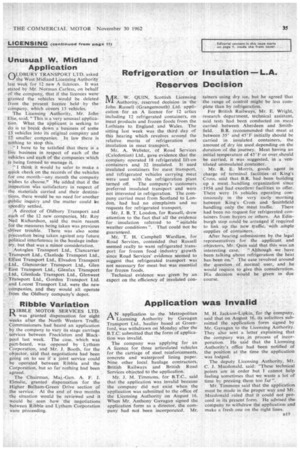Refrigeration or Insulation L.A. Decision Reserves
Page 37

If you've noticed an error in this article please click here to report it so we can fix it.
ik AR. W. QUIN, Scottish Licensing 1V1. Authority, reserved decision in the John Russell (Grangemouth) Ltd. application for an A licence for 12 artics including 12 refrigerated containers, on meat products and frozen foods from the Lothians to England and Wales. The sitting last week was the third day of this hearing which revolves around the relative merits of refrigeration and
insulation in meat transport. • _
Mr. A. Webster, of Road Services (Caledonian). Ltd., gave evidence that the company operated 18 refrigerated lift-on containers and 32 insulated. It used insulated containers for meat transport, and refrigerated vehicles carrying meat were used with the refrigeration plant turned off. The company's custornets preferred insulated tranSport and were not interested in refrigeration. The company carried meat from Scotland to London, had had no complaints and no requests for refrigerated transport. Mr. J. B. T. Loudon, for RusselLdrew attention to the fact that all the evidence for insulation referred to "suitable weather conditions ". That could not be guaranteed. Mr. T. H. Campbell Wardlaw, for Road Serviees, contended that Russell seemed really to want refrigerated transport for frozen food industry -growth since Road Services' evidence seemed to suggest that refrigerated transport was not necessary for meat but was essential for frozen foods. Technical evidence was given by an expert on the efficiency of insulated con • tainersusing dry ice, but he agreed that the• range of contral might be less complete than by refrigeration. For British Railways,' Mr. E. Wright, research department, technical assistant, said tests had been conducted on meat carried between Aberdeen and Smith field. B.R. recommended that meat at between 35° and 45`F initially should bc carried in insulated containers, the amount of dry ice used depending on the duration of the journey. Meat having .an' initial temperature of 45'F or over should be carried, it was suggested, in a ventilated uninsulated container. Mr. R. E. Morris, goods agent in charge of terminal facilities at King's Cross, said that B.R. had been building up a meat handling organization since 1954 and had excellent facilities to oiler. There were 16 vehicles operating continuously in the very early morning between King's -Cross and Smithfield handling only the meat traffic. There had been no request for refrigerated containers from buyers or others. An Edinburgh stop could be arranged if required to link up the new, traffic, with .ample supplies of containers. . • _After hearing submissions by. the legal representatives for the applicant and objectors, Mr. Quin said that this was an interesting case, "Although we have been talking about refrigeration the heat has ben on." The case revolved around the question of normal user, and he would require to give this consideration. His decision would be given in due course.




































































































